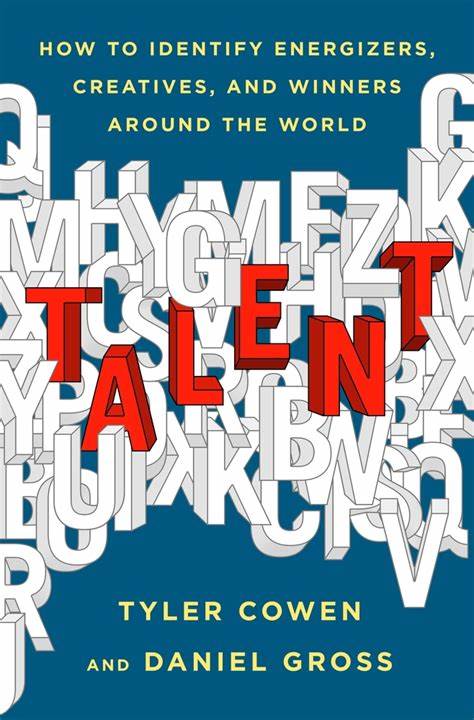
I enjoy recruiting. It gives you a chance to meet new people and find out about the qualities they have, perhaps offer them a job.
But often the process – standardised questions, very specific answer requirements – robs you of any chance of developing a mutual understanding.
As a recruiting manager, I’ve found myself asking questions like:
“Can you tell me about a time when you have done a big project which went a bit wrong, but ultimately turned out all right due to the skills and behaviours you demonstrated which perfectly align with the score sheet I will have to fill out at the end of this soul-eviscerating process?”
Ok, it’s possible this isn’t exactly a HR interview question, but it’s not far off how it feels.
It is at best stultifying; at worst, you might turn down someone brilliant.
Fear not, though, as here to save the day with their big brains and capes is economist Tyler Cowen and investor Daniel Gross who have written a pleasingly snappy book on the subject, called Talent.
This book is a must-read for those involved in recruitment, but if you don’t want to shell out upwards of a tenner on it, here are some key take-outs.
Have an actual conversation
This is probably their most important, and simple, piece of advice. You must do everything you can to get away from the pre-packaged answers that a candidate arrives with, and move onto more interesting terrain. You could establish some kind of common ground, such as where they have worked, where they live, or cultural or sporting interests. You could ask them something about what they did that morning, at the weekend, on the evenings – anything so that the candidate starts to reveal themselves.
Ask questions that surprise the candidate
This sounds obvious, but often an interviewer is simply asking questions supplied by HR, rather than something they are interested in. The candidate feels this, and the whole process can veer dangerously towards a meaningless charade.
Tyler and Daniel suggest questions which perform the function of surprising the candidate and forcing them into spontaneous answers.
For example:
- How do you feel you are different from the people at your current company?
- What subreddits, blogs or online communities do you enjoy?
- And the slightly terrifying: What’s a story one of your references might tell me when I call them?

Be comfortable being uncomfortable
If you want to have a meaningful conversation with a candidate, it is inevitable that there will be times when the person either has to think for a while before answering, or gives you a look which says, ‘do you actually want me to answer that?’ Tyler and Daniel advise – this is all good. As long as you are asking questions in good faith, and not trying to trick a candidate, then it’s ok to have moments when things get a bit sticky. That means you have moved away from standard questions and standard answers, and may just be getting somewhere interesting.
Zero in on a candidate’s motivation
I have asked why someone wants a job, and I have sometimes asked motivation related questions.
But I have never asked, as they suggest, “How ambitious are you?” This obviously reaches beyond the present job for which they are interviewing, and looks at something longer term. If the candidate has an ambition that is genuine, then it will be likely well thought-through. If it isn’t, of course, then you gain a not particularly positive insight.
Go meta
They suggest allowing a person to talk about their belief systems, and be analytical about it. To this end, asking: “Which of your beliefs are you least rational about?”
I have a whole stack of these, as perhaps we all do. I like cyclists generally, but hate Boris bikers. I like vegetarianism but think veganism is ridiculous. I like 60s music, but loath Paul McCartney. And so on.
This gets you closer to the actual person and helps to see how their mind works. In my case, they may think me a charming addition to the team or a bizarre weirdo who should be shown the door.
They also suggest the rather brutal: “How do you think this interview is going?” This might allow for some good self-analysis and allow the candidate to shine, but some good people may just dead-bat it. Proceed with caution.
Interview referees
This again might seem completely esoteric for many companies, who only ask a referee to confirm the basic truthfulness of a candidate’s CV. But I was particularly struck by this as a useful approach.
They suggest asking: Is this person so good that you would happily work for them?
I love this question. It makes the referee, and you, consider the person at least a level or two above the job they are applying for. If a referee can say, I was this person’s manager, but I would be happy for the relationship to be the other way round, that is a massive tribute to the candidate’s all-round behaviours and competence, and probably their willingness to develop their skills. Rather than the formulaic – would you hire this person again – which is a fairly low bar, it takes you into the realm of actual insight.
Being inclusive could very well give you a huge advantage
Tyler and Daniel are mostly interested in high-end talent that can transform a workplace and make outrageous innovations and/or a lot of money. They want people who see the world differently. They argue that the top-end of talent is a rarified place, and most of the available talent is easy to identify. Therefore, they go into quite a lot of detail about why going after diverse talent, ie women, people from different ethnic minorities, and disabled people, is potentially hugely rewarding.
On disabled candidates they highlight Greta Thunberg (autism) and Richard Branson (dyslexia) and say: “Even if you think disabilities are disadvantages on net, many of them come with offsetting advantages in the overall package. And sometimes these advantages can be very impressive.”

Women often get ignored for really stupid, man-related reasons
Men, this bit is quite embarrassing.
Tyler and Daniel lay out details of a study of over a thousand venture capital pitches.
It showed that women-only teams were judged more stringently on pitch quality than men, revealing that “women have to walk a thinner tightrope when presenting themselves to the outside world.
“But the really striking result was this: when women pitched on mixed-gender teams, the quality of the women’s pitch didn’t really matter at all. It seems the potential investors paid attention only to what the men said.”
If this isn’t bad enough they continue, “Anecdotally, we have found that men have a harder time judging the intelligence of women, because women often present themselves as more agreeable in an interview setting than men do…Many men will incorrectly downgrade the intelligence of an especially agreeable woman…In essence, male judgement often goes astray when women are (a) quite agreeable or (b) not very agreeable.”
Basically, men: make sure there is a woman on your interview panel or you could be doing you, your company and female candidates a massive disservice.
Conclusion – we can do better.
Recruitment is really important and, on the whole, we can do a lot better. We need to have actual, interested conversations in interviews. We need to make sure we are thinking broadly about the skills we need. We probably need some structure to the interview question process but that should include spontaneous interaction and the possibility of getting to know the person as a person, rather than a series of case study examples of things they may have done well (or may have massively dressed up).
Reading Talent does make me question – what is a fair process? They suggest a loose but earnest approach that taps into who the person is. It’s possible that this could misfire if done badly. But the overall point they make, that you need to cut through the inherent fakeness and preparedness of the interview process to something deeper, must be correct.